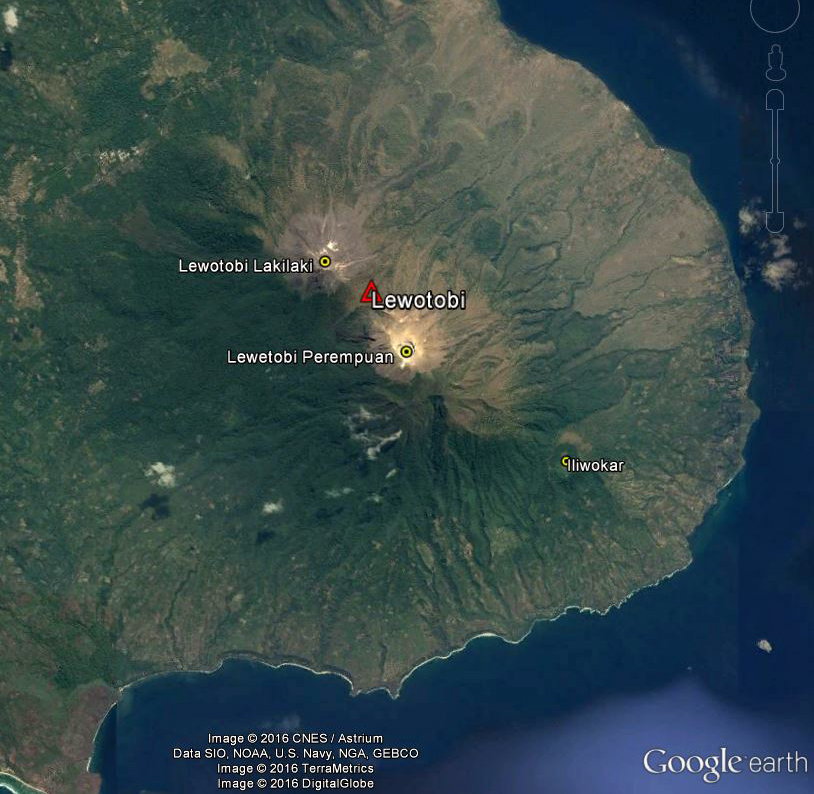Lewotobi Laki-laki
« previous post | next post »
A serious volcanic eruption on Flores Island has been going on since October 30:
The Pusat Vulkanologi dan Mitigasi Bencana Geologi (PVMBG) reported that eruptive activity intensified at Lewotobi Laki-laki during 30 October-5 November, which included a major eruption resulting in fatalities. The large explosive eruption began at 2357 on 3 November, generating pyroclastic flows that traveled down the flanks in all directions, ejecting ballistic projectiles, and forming a large vent within the summit crater.
And recent news reports tell us that the eruptions continue, e.g. "Indonesia’s Mount Lewotobi Laki Laki continues to unleash towering column of hot clouds", AP 11/8/2024.
I was curious about the name "Lewotobi Laki-laki" — what language is it, and why is it so long?
The first clue is provided by this Google Earth image from the Smithsonian's Global Volcanism Program:
The caption gives us part of the answer — Lewotobi has two "stratovolcano" peaks, Laki-laki and Perempuan:
Satellite image from 4 September 2013 showing Lewotobi volcano and associated features on eastern Flores Island: the two stratovolcanoes Lakilaki and Perempuan, and SE flank cone Iliwokar. The crater on the smaller Lakilaki edifice to the NW is 400 m wide, while Perempuan's is 700 m wide.
And the Wikipedia article tells us what those modifiers mean:
Lewotobi is a twin volcano located in the southeastern part of the island of Flores, Indonesia. It has two peaks; the Lewotobi Laki-laki (Male Lewotobi) and Lewotobi Perempuan (Female Lewotobi) stratovolcanoes. The more active Lewotobi Laki-laki is about 2.1 km (1.3 mi) northwest of the taller Lewotobi Perempuan.
As for what language the names are in, the Cambridge Indonesian dictionary confirms that laki-laki means "masculine" or "man", while perempuan means "female" or "woman". There's no entry for lewotobi — which might be from one of the numerous other Austronesian languages spoken locally. Wikipedia has an entry for the Lewotobi language:
Lewotobi is either a separate Central Malayo-Polynesian language or dialect of Lamaholot of Flores island in Indonesia. It is presented as a separate language by Ethnologue and Grimes (1997). Nagaya (2011), in his description of Lewotobi, disputes this, classifying it instead as a dialect of Lamaholot.
So maybe Lewotobi is also an ethnonym, with the mountain named after the local people? Or the people named after the mountain they live near? In either case, I'm still curious about the name's etymology.
The main city nearby seems to be Larantuka, and Wikivoyage says that "Larantuka Malay (also known as Ende Malay), a local dialect over 80% cognate with Indonesian, is used as a lingua franca in this area", so the names laki-laki and perempuan might predate the standardization of Bahasa Indonesia.
And I'm sure there's a story about why the two peaks are named "male" and "female", but I haven't been able to find it.

J.W. Brewer said,
November 8, 2024 @ 2:21 pm
I'm not sure whether one should expect the Cambridge dictionary to have entries for "proper nouns" such as toponyms – dictionaries vary greatly in that respect. But it seems more likely that a longstanding toponym/ethnonym would be in a local language rather than in an L2 trade language or politically-promoted common L2 like Ende Malay or Bahasa Indonesia. Whether "Lewotobi" is a separate language or a dialect of Lamahalot, it is in either case part of what wikipedia calls the Flores-Lembata subsubsubgroup of Malayo-Polynesian, at least if wikipedia's taxonomy is accurate, and wikipedia further says that the Flores-Lembata languages are "suspected" of having a non-Austronesian substrate. Of course in many languages toponyms can sometimes be etymologically opaque without needing a substrate-language-no-one-knows-anymore explanation for the opacity.
One might also want to know if Lewotobi speakers use the same modifying adjectives for the two different peaks as the Bahasa Indonesia ones the standard maps apparently do, or whether they have different names in local speech at least as to the modifier.